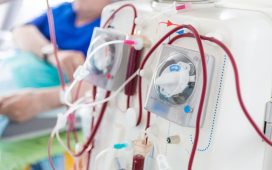Abecma indicated for patients with relapsed or refractory multiple myeloma who have received at least four previous types of therapy
TUESDAY, March 30, 2021 (HealthDay News) — Abecma (idecabtagene vicleucel), a chimeric antigen receptor (CAR) T-cell therapy, was approved by the U.S. Food and Drug Administration for the treatment of multiple myeloma, the agency announced Saturday.
Abecma, a B-cell maturation antigen-directed genetically modified autologous CAR T-cell therapy, is the first cell-based gene therapy to be approved for patients with multiple myeloma and is indicated in those with relapsed or refractory multiple myeloma who have received at least four previous types of therapy. Each dose of Abecma is customized using the individual patient’s T cells, which are collected, genetically modified, and infused back into the patient. The FDA approved Abecma with a risk evaluation and mitigation strategy that requires hospitals to be specially certified and staff to be trained in recognizing the potential severe side effects of this treatment.
Approval of Abecma was based on data from the KarMMa study, a phase 2 multicenter study of 127 patients with relapsed or refractory myeloma who had been treated with at least three previous lines of therapy. Seventy-two percent of 100 evaluable patients had a partial or complete response. Complete response was seen in 28 percent of patients, and 65 percent of those with complete response maintained response for at least one year. Median time to response was 30 days, and median response duration was 11 months for all responders and 19 months for those who achieved complete response.
Abecma can cause severe side effects and includes a boxed warning for cytokine release syndrome (CRS), hemophagocytic lymphohistiocytosis/macrophage activation syndrome, neurologic toxicity, and prolonged cytopenia. Commonly reported side effects, which typically appear within the first one to two weeks after treatment, include CRS, infections, fatigue, musculoskeletal pain, and a weakened immune system.
Approval was granted to Celgene Corporation, a Bristol Myers Squibb Company. The manufacturer is required to conduct a postmarketing observational study in patients treated with Abecma.
Copyright © 2021 HealthDay. All rights reserved.








